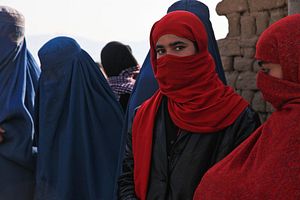Afghanistan’s first 26-year-old female mayor is awaiting her assassination. Zarifa Ghafari is the mayor of Maidan Shar in Wardak, a conservative and remote province.
On her first day, her office came under attack. The Taliban didn’t do it. It was local men. Angry at her appointment, they were throwing sticks and rocks at her office. They yelled at her to never return.
Ghafari’s appointment comes as the president has appointed women in unprecedented positions of leadership.
Some of the most important positions are filled by women. Adela Raz is Afghanistan’s top diplomat abroad — the country’s first female permanent representative to the United Nations. Roya Rahmani is the first female ambassador to the United States.
In fact, the percentage of women lawmakers in Afghanistan is higher than the United States’.
Yet, Afghan women in positions of power face significant challenges compared to their female counterparts in other parts of the world.
The cliché —in Afghanistan, being a woman is a crime — couldn’t be more true.
Raz, during her previous role as the deputy minister of economic affairs at the Ministry of Foreign Affairs, noted that women were met “ with daily indignities… from the biases shown in seating arrangements at high-level meetings to the disrespectful behavior of the guards at the entrances of government buildings.”
Ghafari too, noted, that men working under her leadership didn’t take her seriously — often ignoring her.
Earlier this year, during a nation-wide assembly on peace, women made up 30 percent of the 3,200 participants. Yet as a woman spoke about peace, a male delegate rose up and told her, “Peace has nothing to do with you. Sit down! You should be in the kitchen cooking!”
The U.S. war in Afghanistan led to the unparalleled presence of women in government. Their presence defies deeply rooted sociocultural norms. Men, in particular, have resisted these changes to the traditional gender roles. As Raz simply put it, “They try to fit this individual into the image they have in their head, and it doesn’t fit.”
These sociopolitical barriers illustrate the complexities of women’s rights in Afghanistan and make it clear that there are no quick fixes. It’s a long road that requires a holistic long-term strategy.
Education is an indispensable ally. A national curriculum targeting traditional patriarchal values while promoting equality and women’s rights is essential to alleviating the plight of Afghan women and encouraging their full participation in society. This curriculum would be a lasting solution to women’s rights in Afghanistan as it prepares future generations to embrace social equality and human rights for all.
Such a curriculum coupled with the continued presence of women in all parts of society is the key to empowering Afghan women for generations to come.
Through this approach, one day, threats against female leaders like Ghafari would become a thing of the past.
Sabera Azizi is a freelance writer and an expert on Afghanistan. Ms. Azizi can be followed on twitter @saberaazizi.

































